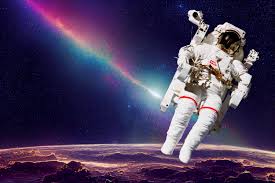Astronauts, the intrepid explorers of space, defy gravity’s confines. They navigate the cosmos, conducting experiments, probing celestial mysteries. Clad in suits, they float weightlessly, tethered to spacecraft, venturing into the unknown. Their courage fuels discovery, unveiling the secrets of the universe, inspiring generations with cosmic odysseys.
Jeff Bezos, the pioneering mind behind Amazon and Blue Origin, embarked on a widely publicized voyage into space in July 2021. This endeavor thrust him into the spotlight not only as a business magnate but also as an ‘astronaut’ in the eyes of many. However, the question of whether Bezos truly qualified as an astronaut raised debates and controversies, delving into the criteria defining an astronaut and the significance of his space trip.
Bezos, accompanied by his brother Mark Bezos, 82-year-old aviator Wally Funk, and Dutch teenager Oliver Daemen, boarded the New Shepard spacecraft on July 20, 2021. The mission marked the first crewed flight for Blue Origin, Bezos’s spaceflight company, and intended to promote space tourism by offering a brief suborbital journey.
The term ‘astronaut’ traditionally connotes an individual trained and employed by a governmental or private agency involved in space exploration, such as NASA. These professionals undergo rigorous training, possess technical expertise, and often contribute to scientific research or space missions. Bezos, despite being a key figure in advancing space technology through Blue Origin, didn’t undergo the extensive training typically associated with astronauts.
Critics argued that his brief trip—lasting around 10-11 minutes and reaching an altitude just beyond the Kármán line, which conventionally delineates the boundary between Earth’s atmosphere and space—didn’t meet the criteria of a significant space mission. They contended that Bezos didn’t experience the complexities and challenges endured by career astronauts during prolonged missions, such as those aboard the International Space Station (ISS).
Conversely, supporters highlighted Bezos’s contributions to the space industry through Blue Origin, arguing that his flight exemplified a pioneering step toward commercial space travel. They emphasized the potential of such ventures in popularizing space exploration, fostering technological advancements, and making space more accessible to a broader demographic.
The discussion also revolved around the changing landscape of space exploration. As private companies like Blue Origin and SpaceX push the boundaries of space travel, the definition and perception of an ‘astronaut’ seem to be evolving. The emergence of civilian space travelers, albeit without extensive training, raises questions about who qualifies as an astronaut in the commercial space era.
Moreover, Bezos’s flight wasn’t devoid of significance. It brought attention to the promising prospects of space tourism, where private individuals could experience space travel, albeit briefly, and glimpse the Earth from a celestial vantage point. This symbolic act aimed to inspire a new generation and foster public interest in space exploration.
Ultimately, while Bezos’s space journey might not align with traditional astronaut qualifications, it underscored the evolving dynamics of space travel. It prompted discussions about the democratization of space access, the role of private entities in space exploration, and the changing definition of an astronaut in the modern era.
Is astronaut a good career option?
Becoming an astronaut, once considered a dream only attainable by a select few, has captured the imaginations of many. It’s a career path that embodies adventure, exploration, and pushing the boundaries of human capability. But is being an astronaut a good career option? Let’s explore the various facets that make it an intriguing yet challenging profession.
Firstly, the allure of space exploration is undeniable. Astronauts are pioneers, venturing into the unknown, conducting groundbreaking research, and contributing to humanity’s understanding of the universe. The opportunity to float in microgravity, conduct experiments in space, and witness Earth from a celestial vantage point is an unparalleled experience.
Moreover, the technological advancements spurred by space exploration have far-reaching implications. The innovations developed for space missions often find applications in everyday life, benefiting various industries from healthcare to communications. Therefore, being part of this field allows for contributions that extend beyond the confines of space itself.
However, the path to becoming an astronaut is exceptionally challenging. The competition is fierce, and the prerequisites are demanding. Candidates typically need an advanced degree in a STEM (Science, Technology, Engineering, Mathematics) field, extensive professional experience, physical fitness, and exceptional problem-solving skills. Moreover, the selection process involves rigorous physical and psychological evaluations, further narrowing the pool of potential astronauts.
Once selected, astronauts undergo extensive training that can last several years. This includes simulations, survival training, learning spacecraft systems, extravehicular activities (spacewalks), and more. The nature of the job demands adaptability, resilience, and the ability to perform flawlessly under high-pressure, high-stakes situations.
The risks associated with space travel cannot be overstated. While technological advancements have enhanced safety measures, space exploration still poses inherent dangers. Astronauts face potential health risks such as radiation exposure, muscle atrophy, bone density loss, and psychological stress due to prolonged isolation in a confined space.
The lifestyle of an astronaut also involves significant sacrifices. Extended periods away from family and loved ones, strict schedules, and the demanding nature of training and missions can take a toll on personal life. Moreover, the job demands a high level of commitment and dedication, leaving little room for other career pursuits or personal endeavors.
Financially, being an astronaut might not always be the most lucrative career. While astronauts receive competitive salaries and benefits, they might not match the earning potential of some professions in the private sector. However, the intangible rewards, such as contributing to scientific advancements and being part of historic missions, often outweigh the financial considerations for those passionate about space exploration.
In conclusion, being an astronaut is a remarkable and fulfilling career for those with a deep passion for space exploration and a willingness to endure rigorous training, face risks, and make significant personal sacrifices. The opportunity to contribute to humanity’s understanding of the cosmos and the potential impact on technological advancements makes it an extraordinary career option, albeit one that demands unwavering dedication and resilience.
In conclusion, Jeff Bezos’s excursion into space stirred debates regarding the qualifications of an astronaut, highlighting the evolving landscape of space exploration driven by private initiatives. His brief but symbolic journey sparked conversations about the future of space tourism, technological advancements, and the expanding horizons of human exploration beyond Earth.




